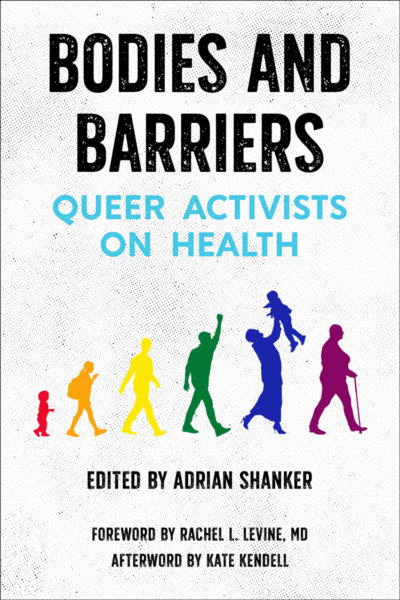
BOOK REVIEW: ‘Bodies and Barriers’
Queer activists voice their frustrations with LGBTQ healthcare.

You woke up this morning feeling pretty good, which was quite a relief.
In these frightening, uncertain times, every day of wellness is a bonus—especially when you consider that healthcare for a gay, lesbian, bisexual, transgender, or queer patient can be different than the care that straight people require. Too bad that healthcare providers don’t always know that.
But read Bodies and Barriers, edited by Adrian Shanker, and you’ll feel more empowered to educate your providers.
If you were to look for books or articles that address healthcare issues for LGBTQ patients, you would find plenty of material. The problem is, says Shanker, most of it was written by people who are not lesbian, gay, bisexual, transgender, or queer.
“Every person providing care for humans is providing care for LGBT humans,” he says. “[So now it’s time for them to hear] our stories about our bodies.”
For the youngest LGBTQ patients, physical and mental healthcare may look different than the care given to their heterosexual peers, or to LGBTQ adults. For example, kids struggle with social issues that adults are better equipped to handle. Parents, as one of the book’s essays indicates, can be the best allies of all.
Young adults, of course, have their own developmental issues. Teens may suffer from depression, suicidal notions, bullying, unprotected sexual encounters, and homelessness—all of which can exacerbate healthcare needs. LGBTQ teens also need help with learning “social-services navigation” in order to access suitable care.
LGBTQ adults seeking good healthcare may need screening for alcohol abuse and other addictions, but doctors sometimes don’t know which tests to ask for. Doctors are often completely uninformed about caring for transgender patients who have transitioned. They may also be uncomfortable managing a patient’s HIV infection, or they may be unaware of the cancers that particularly affect LGBTQ individuals. As a gay, lesbian, bisexual, or transgender adult, being your own highly vocal advocate is key.
Shanker has assembled a chorus of voices whose viewpoints and frustrations could ultimately teach healthcare workers a thing or two. While most of the essays impart a calm but determined tone, readers shouldn’t be surprised at the feelings of resignation that are revealed in a few of the stories, or the occasional flashes of anger and outrage.
So wash your hands, don’t touch your face, and read Bodies and Barriers so you can go to your next doctor’s appointment equipped to tell your doctor about the kind of health care you really need.
This article appears in the September 2020 edition of OutSmart magazine.











FB Comments